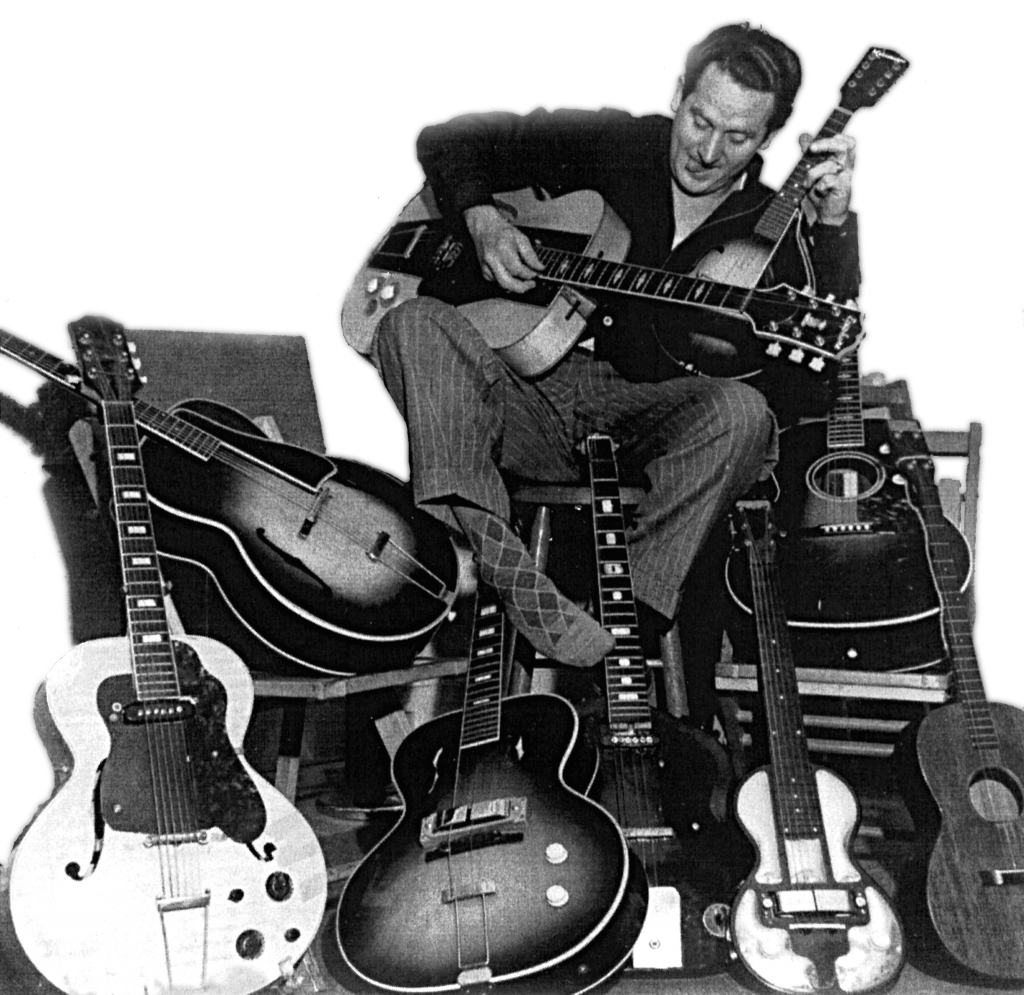From a very early age, it was obvious that young Lester William Polsfuss had a knack for music. But by his mid teens, it became clear that it was more than just a knack; he was virtually a prodigy. Starting around eight years old, young Lester toyed with anything he could get a melodic sound out of, but, after picking up a guitar, his obsession and passion for sound quickly blossomed into a fruitful career that would go down in music history.
Before he was even a teenager, he was making money in tips performing around his hometown of Waukesha, Wisconsin. By 1934, Lester, then in his early teens, had dropped out of high school and was performing in and around Chicago. He had encountered many obstacles of the music electronics of the day.[1. Salem Press Biographical EncyclopediaResearch Starters, 2017, s.v. “Les Paul,” by John R. Holmes.] Guitars were simple and all somewhat similar, and recording music with a full band was a troublesome and repetitive ordeal. He did not intend to be limited by either of these issues. Rather than fall into the repetition of the music industry of his day, he began to set himself apart by experimentation.
Lester’s instrument ideas were at first shot down by large corporations. In 1941, he even brought one of his first solid-body guitar prototypes to Gibson, but the company quickly dismissed him.1 This rejection seemed to motivate him even more, and he returned to the drawing board while his performing career began to culminate.
He despised the fact that his early music sounded so similar to other artists of the day. Because of this, in 1947, Polsfuss started his own recording studio, in which he began utilizing over-dubbing and multitrack recording, which allows one musician to record one instrument at a time and overlay them so that it seems that they are being played at the same time.2 Although it was at first a venture for his own personal music, many musicians flocked to his home studio wanting to be recorded by Lester.
Just as these endeavors were taking off, in 1948, Lester suffered an almost career ending injury, in which his elbow was crushed beyond the point of reconstruction. He made the choice to have his right arm permanently set at less than a 90 degree angle, leaving him the ability to cradle a guitar.3 This action alone is a prime example of the dedication that Polsfuss possessed. Instead of letting his accident end his playing, or let his early failures deter him, he continued to strive to improve and increase the options for creativity that musicians had. He tried again to invent a solid body guitar and new sound recording techniques, all while continuing to work on his own music.
His talent on the guitar gained him so much attention that Gibson, while still unwilling to accept his prototype guitar model, decided to hire him as somewhat of a consultant.4 They wanted his name associated with their product, and they wanted his unmatched innovative mindset. The company created their own solid-body guitar model with the help of Lester, and the name came naturally.5 The Les Paul guitar was created, while Lester came to reach the pinnacle of his fame.

Unwillingness to settle was what set Lester apart from other musicians of the day—his constant need to experiment and create something better or at least different. Rather than just becoming the best he could be at the instruments of the day, he almost seemed more interested in creating new and improved devices to improve his playing. Without this determination, he might have just been another musician in history.
Les Paul, suffering from injury, old age, and arthritis, still continued to play guitar and work with music until his death in August of 2009.3 His lifetime achievements consist of his induction into the Rock and Roll Hall of Fame in 1988, a National Medal of Arts in 2007, multiple Grammys and Emmys, and countless other honors. While his guitar playing styles were an influence to guitarists everywhere, his greatest influences on the music industry were his help in creating a solid body guitar and his creation of over-dubbing and multi-track recording, which have been used by almost every musician since. His name has been immortalized in music history because of his contributions, and any fan or member of the music community has reason to thank him.
- Paul Verna, “‘Just A Pure Genius’: celebrating the legacy of Les Paul, the tinkerer who (really) helped invent rock’n’roll,” Billboard, (2015): 67. ↵
- “The Man Before The Guitar: Remembering Les Paul At 100,” All Things Considered, (June 9, 2015). ↵
- Salem Press Biographical EncyclopediaResearch Starters, 2017, s.v. “Les Paul,” by John R. Holmes. ↵
- “Les Paul and the Electric Guitar,” Innovation Masters: History’s Best Examples of Business Transformation, (2012): 196-199. ↵
- Calen D. Stone, “Paul, Les,” Contemporary Musicians, Vol. 2, (1990): 186-188. ↵
- Salem Press Biographical EncyclopediaResearch Starters, 2017, s.v. “Les Paul,” by John R. Holmes. ↵



52 comments
Noah Laing
I found this article very interesting because I love music, especially the guitar. I found Les Paul’s story appealing because I used to take guitar lessons and I’ve always thought of guitars as such a dynamic instrument. Les Paul’s drive and determination to battle through adversity seems to have paid off as he’s now solidified himself in music history.
Natalie Childs
Great article! While I had heard the name Les Paul and knew about his guitars, I never really knew much more other than that. It seems crazy now that Gibson would turn him down, considering his success, but when I thought about it, it seems many greats are turned down their first try and go on to be even better, like Les. Les Paul seems like he was a great guy and should be an inspiration to everyone to never give up.
Erin Vento
I think it’s really inspiring for someone to go after their dreams in general, but to continue to chase them even after something terrible happens takes a whole new level of courage. I had heard about Les Paul, but I never knew anything about his life. This article was really enlightening and encouraging for the readers who may only know his music and not be educated on his life.
Alexandra Lopez
Prior to reading this article, I had no idea who Les Paul was. I honestly didnt have a clue and to what this article would be about. As I was reading this, a light bulb went on in my head. I did know this name. I knew the guitars. But reading about the man behind the name was amazing. This article was extremely informative for me. I’ve always wanted to learn how to play the guitar but every time I try, I immediately give up. Reading that Paul didn’t give up and kept on chasing after his goal was truly inspiring. I adored this article very much.
Julian Aguero
Its nice to know the man behind the name. Les Paul has a truly inspiring story. Not many people have the dedication like Les, even for the things that we love. It is inspiring for someone to be willing to endure pain just to keep playing music. I didn’t know about the history of Les Paul until this article and now I am glad to know how influential and motivated he was; as a Man and not just as a brand. He never gave up on his dream. I believe his perseverance to keep going is what made him a great man.
Carlos Vazquez
I have always heard of the legendary Les Paul guitars, but I had no idea how much the creator Lester Polsfuss struggled. His perseverance and passion for playing guitar and making music allowed him to become one of the greatest guitarist of all time. This article does an amazing job at describing how Lester Polsfuss was able to succeed in spite of health problems and rejection.
Reese Lujan
I’ve seen my dad play the guitar and he’s always tried to teach me how to play the guitar. I never knew where who was responsible for creating some of the most amazing guitars this world has ever seen. The most intriguing part of this story was the way that even with his disability in his arm he still found a way to play his instrument.
Caroline Bush
Interesting article! I don’t play guitar myself but even I know what a Les Paul guitar is. I find it inspiriting how Les Paul didn’t let anything stop him from accomplishing his goal. I honestly didn’t know that much about Paul’s history until reading this article but I can say after reading this I have a newfound respect for the man. I’m glad that in the end Paul got the recognition he deserved and was able to continue his passion with music. Overall I enjoyed this article and can say that I’m walking away with a newfound appreciation for guitars and Les Paul.
Samuel Ruiz
Being a guitarist in a band, I found myself a little disappointed in myself after reading this article. I had known of Les Paul, and have had many Les Paul guitars and I never even knew the story of Les Paul. This article was well written and gave me great insight into the story of the man behind the guitars I had been playing and especially the one I play now. Well done!
Kailan Pena
Since I play guitar and bass I know of Les Paul’s fantastic guitars, but I had no idea Les’ guitars weren’t initially recognized or appreciated. As a matter of fact, I didn’t even know that Les Paul was also a songwriter or a recording artist, so this was an interesting read. Now I have some fun facts to bring back to my band!